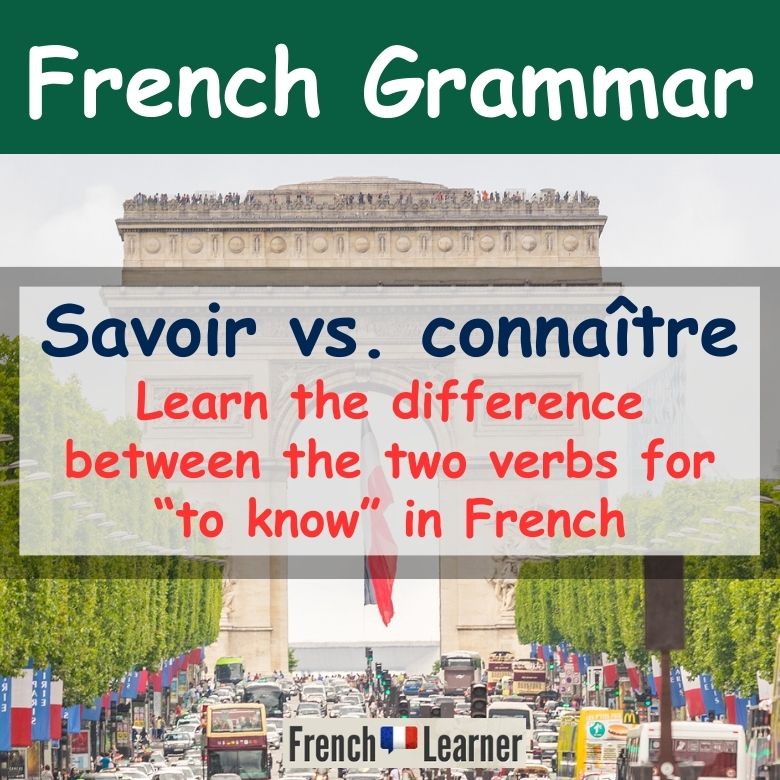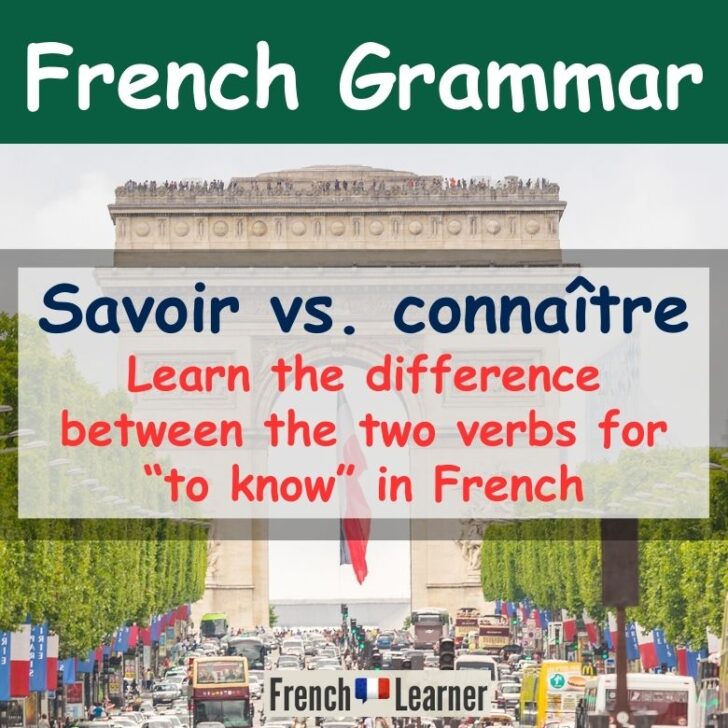In French, both savoir and connaître mean to know. Use savoir for obtained knowledge including facts or knowing how to do something. Use connaître for knowing or being acquainted with people, places and areas of study. The rest of this article will explain savoir vs. connaître with example sentences.

Savoir vs. connaître
Use savoir for acquired facts and connaître for knowing people and places.
- Je sais que tu parles français. I know you speak French.
- Je ne sais pas ou tù habites. I don’t know where you live.
- Je connais Paul. Je ne connais pas Marie. I know Paul. I don’t know Marie.
- Je connais Paris. Je ne connais pas Rome. I know Paris. I don’t know Rome.
How to use savoir
The most important thing to say about savoir is that it’s used for facts. “I know the sky is blue”, “I know the earth is round”.
- Le ciel est blue. Oui, je sais!
The sky is blue. Yes, I know! - La terre est ronde. Oui, je sais!
The earth is round. Yes, I know!
A quick exclamation of “I don’t know” or “who knows?” requires the use of savoir.
- Je ne sais pas! I don’t know!
- ui sait! Who knows!
Another key hint is that the savoir can be followed by the following:
Savoir example sentences
- Est-ce que tu sais s’il vient? Do you know if he’s coming?
- Est-ce que tu sais où il habite? Do you know where he lives?
- Est-ce que tu sais comment il chante? Do you know how he sings?
- Je sais que le ciel est bleu. I know the ski is blue.
- Je ne sais pas quand il arrive. I don’t know when he’s arriving.
- Est-ce que tu sais s’il fait beau. Do you know if it’s nice out?
To know how to do something
To express knowing how to do something (a skill or something that you have to learn how to to do), use this following structure: “Savoir + infinitive”. For example, “Je sais nager” (I know how to swim).
- Est-ce que tu sais chanter? Do you know how to sing?
- Oui, je sais chanter. Je chante très bien! Yes, I know how to sing. I sing very well!
Avoid this common mistake
A very common mistake that beginners make is to use connaître instead of savoir when expressing the idea of “Yeah, I know”. For example:
- Le ciel est bleu. The sky is blue. -Oui, je sais! Yes, I know! (Correct!)
- Le ciel est bleu. The ski is blue. – Oui, je connais! Yes, I know! (Incorrect!)
How to use connaître
Connaître means to know, specifically to know a person, place or area of study.
A key hint here is that connaître cannot be followed by the words that can follow savoir such as que, où, quand, comment, etc. “Je connais que” is WRONG. Use “Je sais que + rest of sentence”.
Connaître example sentences
- Je ne connais pas Jacques mais on m’a dit qu’il est très sympa. I don’t know Jacques but I heard he’s really nice.
- Je connais bien l’histoire française. I know French history well.
- Je connais Paris mais je ne connais pas Marseille. I know Paris but I don’t know Marseille.
For knowing a person connaître doesn’t have to mean having met face-to-face. It can be loosely translated to “know of” or “familiar with”
- Tu ne connais pas ce chanteur? You don’t know this singer?
- Tu ne connais pas ce film? C’est excellent! You don’t know this movie? It’s excellent!
Connaître: to have lived or experienced.
- Il a connu un grand succès à partir de l’âge de 45 ans. He experienced a lot of success starting from the age of 45.
Connaître in the passé composé = met.
- Elle a connu son vrai père à l’âge de vingt-huit ans. She met her real dad when she was 28 years-old.
- Comment est-ce que tu as connu ta femme? How did you meet your wife.
Connaître vs. rencontre in the passé composé
Both verbs connaître and rencontrer both mean “met” when used in the passé composé.
- Où avez vous connu votre femme ? Where did you meet your wife?
- Où avez-vous rencontré votre femme ? Where did you meet your wife?
Related lessons
References
- laits.utexas.edu (includes practice exercise)

